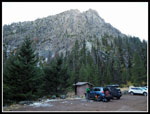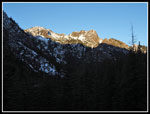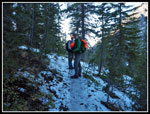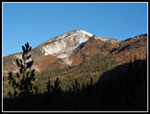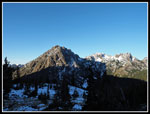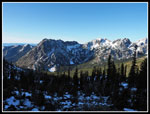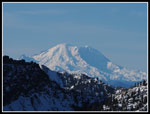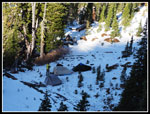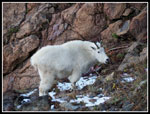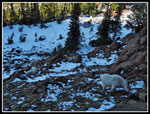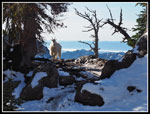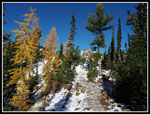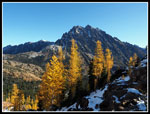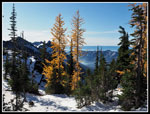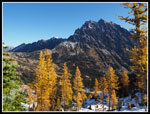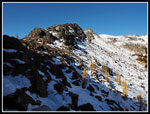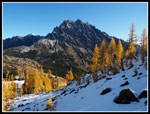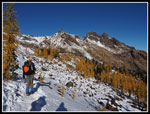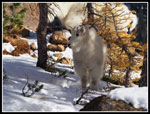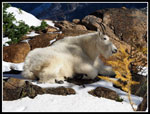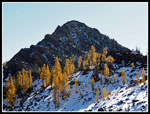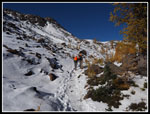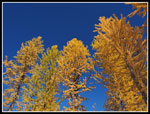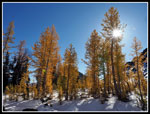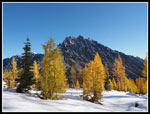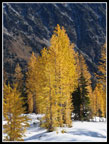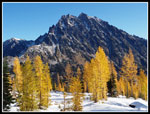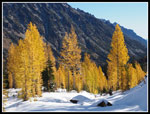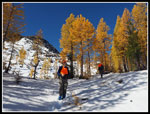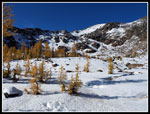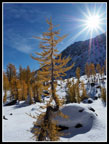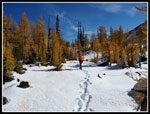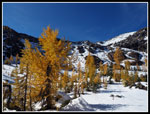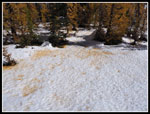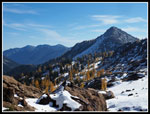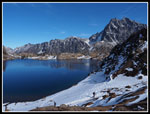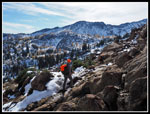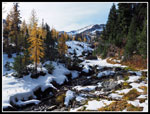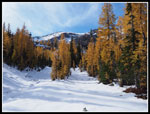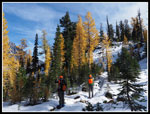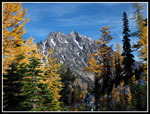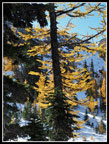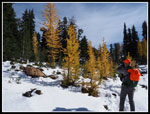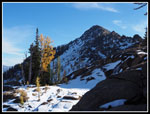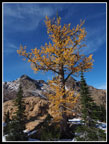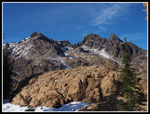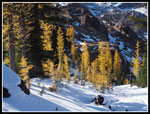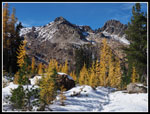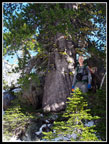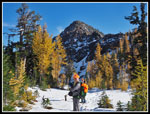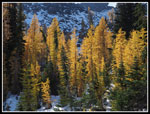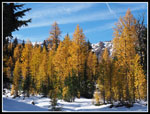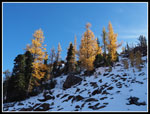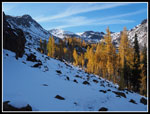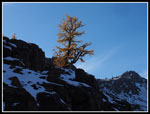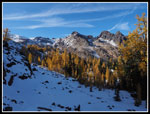10-15-17
I
had been out for a fall trip to
see golden larch trees for the last 17 consecutive years. I have not
missed many in the last 30 years. Back in the 1980s the crowds were
small. Since the Internet the crowds have grown. This year things were
not working out well. Between busy schedules and bad weather forecasts
we missed several opportunities. We had one last chance. Larch trees
have green needles that turn golden in the fall for a short period
before they fall off or more often are blown off by October storms. The
needles are a dull yellow until lit up by sunshine. Some sun is very
helpful for bringing out the colors. A little snow on the ground and
surrounding peaks is even better. The early forecast for the weekend
was not good east of the Cascade Crest. As the week went along it kept
improving. Gary, John, and I settled on Sunday. I had a Saturday
evening event and did not get home until 10:20 pm. Crowds on the
Ingalls Pass Trail have become huge on weekends with peaking larch. We
knew we needed an early start.
Early it was. I was in bed at 10:55 pm and up at 4:30 am. Sleep, what sleep? I was on my way by 5:15 am and met Gary and John just past Issaquah at 5:45 am. Sunrise was still well out in the future. Traffic was no problem at that hour. We did find fog on the east side of the mountains. It thinned a bit from Easton on. Thinned as in we had good visibility ahead but the low cover blotted out the sun after it rose. Driving up the Teanaway Valley the sky began to clear. It was only 26 degrees and we could see some of the remains of the recent fire. Farther up the valley we could smell smoke, likely from the Jolly Mountain fire. We reached the 4250' parking lot at about 7:30 am. The sky was clear and the temperature was up to 30 degrees. The lot was about half full. We did beat the coming crowds. There were some cars parked down the road with icy windshields. We expected there would be some overnight hikers.
We were packed up and on the move by 7:38 am. Probably the earliest Ingalls larch start we have ever had. The trail was bare at first. It was quite cold at first but as we rose out of the valley it warmed up. Higher up in forest we found packed ice on the trail. Once it became more consistent we stopped to put on traction devices. With them our footing was excellent. By the time we reached the junction with the Long's Pass Trail the route is mostly out in the open and the ice mostly disappeared. Before long we took off the spikes. The early morning light and clear sky made for great views of Koppen, Fortune, and the Esmerelda Peaks. Just a little fresh snow to highlight the mountains. We stopped a number of times for photos. Another benefit of our early start. We had lots of time.
I expected a number of folks to pass us by but few did. We found more ice nearer to Ingalls Pass. The traction devices went on once again. We also met a few groups already heading down. They mentioned a very cold night and great views at sunrise. Before the last traverse to the pass we saw three tents below us in a small meadow. We also saw our first mountain goats of the day. A group of five or so goats were in the meadow and heading up our way. We took a longer break as the goats came much closer to us. Lots of good photos. Just below the pass we met another goat a short way off the trail. This is the first time I've seen goats before reaching Ingalls Pass.
There are a few golden larch trees just before the pass. Once at the pass they are everywhere. From Ingalls Pass we had great views across Headlight Basin to Fortune, South Ingalls, Main Ingalls, East Ingalls, and Mt. Stuart. All the peaks had some fresh snow on top. The basin itself was almost entirely snow covered. The larch looked to be very near their peak. It was up to about 40 degrees too. With all our stops we took 2:10 to hike up just over 3 miles with 2250' of elevation gain to the pass. Some larch trees were lit up by the low morning sun. Many were dull from this angle. After a break we headed on down into upper Headlight Basin. The route down was a well packed trench in a solid snow cover. I still had not put on my gaiters though we all had on traction devices. There were a few "holes" in the snow track but we did not have any trouble. Once off the rocks the track was smoothly packed snow and not very deep.
We go off trail here to get better angles against the sun. When backlit, the larch turn a bright golden color. We had good views over to the pass and had golden larch to frame Mt. Stuart. For much of the rest of the day we slowly hiked around the upper basin before heading on to the lake. As we arrived in the upper basin we met another goat family. Two adults and a kid were comfortable just watching the close by hikers taking their portraits. It was now 10:25 am and the hordes began to arrive en masse. Most of the folks were heading straight to Ingalls Lake. They stopped for a few photos but seldom left the packed route. Though dogs are not allowed on the Ingalls Trail, we almost always see a couple. This year we did not see a single one.
Soon we were back on the route. The best color was behind us so we kept looking back for most of our photos. Down at the snow covered meadow we detoured on the route to the toilet. It goes through a big grove of larch trees. it is one of the more photogenic spots on the whole route. We were the only folks over there. Big and small larch trees are in the grove. All the trees provide all angels to maximize the colors for photos. A few weeks earlier John mentioned how to take a photo including the sun and get a starburst effect. I asked again and he mentioned using a very small aperture (the biggest number like f/22). We had cameras with aperture priority settings and had some fun playing around with it. I managed some pretty good starburst sun shots.
After a food break and more photos it was 12:10 by the time we headed to the lake. Coming around the end of the basin the snow mostly ended. We took off our spikes for the hike to the lake. One group left or lost the trail and was scrambling straight up to the lake. We stayed on the route. To no surprise we found lots of folks at Ingalls Lake. First we sat high above the lake on the rocky slabs. Great views of the lake with Mt. Stuart beyond. There was little wind, it was near 50 degrees and absolutely beautiful. We often go to the far end of the lake but this year we chose not too. We were considering going back through the lower basin and wanted to be early enough that the sun would still be shining down there. We finished lunch and headed down to the shore for better shots of Mt. Stuart behind the lake.
It was 1:30 pm when we dropped down from the lake. Numerous groups were still coming up as we headed back. We did take the lower basin trail. The descent was largely on bare dirt. At the bottom we found a track in the snow. It was all snow from there back to Ingalls Pass. On one previous larch trip we traversed the lower basin. The trees there were more green and it was late enough that we were mostly in shade. This year the trees were near peak and we were early enough to still have lots of sunshine. Thin clouds were moving in at the lake and we did have on and off shade on the trip back to the pass. Still, we had moments of bright sunshine too. We saw a couple and a large group and came to a single tent. Otherwise, the lower basin provided a great deal of solitude where the upper basin was a long line of hikers passing through. We were in no hurry and made very slow progress. It was 3:15 pm when we reached Ingalls Pass. On the way up to the pass we head the loud droning of a drone. They are not allowed in wilderness. This is the first but undoubtedly not the last time I will have to listen to them in the mountains.
We took our last food break of the day. Sitting in the sunshine we looked down to the NF Teanaway Valley and saw smoke heading our way. We went through patches of it on the way down but it was not as bad as I feared. I had way more than enough smoke while hiking this summer. We headed down at about 3:30 pm. Just below the pass we had our fourth and last meeting with the mountain goats. These were the closest to the trail we saw all day. Now it was just a slog down to the car. The icy parts had melted to slush and we did not need extra traction again. The trail was not too crowded coming down. We did find a number of folks moving quickly who passed us. We reached the bottom a little before 5:00 pm. Our time down with few photos was about 1:50 minutes faster than our time going up.
This now makes it 18 straight years that I have had at least one larch hike. This was one of the best. The crowds are now many fold what they were 15 - 20 years ago but with an early start, some off route exploring, and a different route back through the basin it was not that bad. The larch trees were right about at their peak. The weather was as good as we could have hoped for. The fresh snow made it all look that much more beautiful. It is a long drive but it is very much worth it. Hopefully I'll be out somewhere next fall for another golden larch hike.
Click on thumbnails to get
larger pictures.
Trips - 2017
Home
Early it was. I was in bed at 10:55 pm and up at 4:30 am. Sleep, what sleep? I was on my way by 5:15 am and met Gary and John just past Issaquah at 5:45 am. Sunrise was still well out in the future. Traffic was no problem at that hour. We did find fog on the east side of the mountains. It thinned a bit from Easton on. Thinned as in we had good visibility ahead but the low cover blotted out the sun after it rose. Driving up the Teanaway Valley the sky began to clear. It was only 26 degrees and we could see some of the remains of the recent fire. Farther up the valley we could smell smoke, likely from the Jolly Mountain fire. We reached the 4250' parking lot at about 7:30 am. The sky was clear and the temperature was up to 30 degrees. The lot was about half full. We did beat the coming crowds. There were some cars parked down the road with icy windshields. We expected there would be some overnight hikers.
We were packed up and on the move by 7:38 am. Probably the earliest Ingalls larch start we have ever had. The trail was bare at first. It was quite cold at first but as we rose out of the valley it warmed up. Higher up in forest we found packed ice on the trail. Once it became more consistent we stopped to put on traction devices. With them our footing was excellent. By the time we reached the junction with the Long's Pass Trail the route is mostly out in the open and the ice mostly disappeared. Before long we took off the spikes. The early morning light and clear sky made for great views of Koppen, Fortune, and the Esmerelda Peaks. Just a little fresh snow to highlight the mountains. We stopped a number of times for photos. Another benefit of our early start. We had lots of time.
I expected a number of folks to pass us by but few did. We found more ice nearer to Ingalls Pass. The traction devices went on once again. We also met a few groups already heading down. They mentioned a very cold night and great views at sunrise. Before the last traverse to the pass we saw three tents below us in a small meadow. We also saw our first mountain goats of the day. A group of five or so goats were in the meadow and heading up our way. We took a longer break as the goats came much closer to us. Lots of good photos. Just below the pass we met another goat a short way off the trail. This is the first time I've seen goats before reaching Ingalls Pass.
There are a few golden larch trees just before the pass. Once at the pass they are everywhere. From Ingalls Pass we had great views across Headlight Basin to Fortune, South Ingalls, Main Ingalls, East Ingalls, and Mt. Stuart. All the peaks had some fresh snow on top. The basin itself was almost entirely snow covered. The larch looked to be very near their peak. It was up to about 40 degrees too. With all our stops we took 2:10 to hike up just over 3 miles with 2250' of elevation gain to the pass. Some larch trees were lit up by the low morning sun. Many were dull from this angle. After a break we headed on down into upper Headlight Basin. The route down was a well packed trench in a solid snow cover. I still had not put on my gaiters though we all had on traction devices. There were a few "holes" in the snow track but we did not have any trouble. Once off the rocks the track was smoothly packed snow and not very deep.
We go off trail here to get better angles against the sun. When backlit, the larch turn a bright golden color. We had good views over to the pass and had golden larch to frame Mt. Stuart. For much of the rest of the day we slowly hiked around the upper basin before heading on to the lake. As we arrived in the upper basin we met another goat family. Two adults and a kid were comfortable just watching the close by hikers taking their portraits. It was now 10:25 am and the hordes began to arrive en masse. Most of the folks were heading straight to Ingalls Lake. They stopped for a few photos but seldom left the packed route. Though dogs are not allowed on the Ingalls Trail, we almost always see a couple. This year we did not see a single one.
Soon we were back on the route. The best color was behind us so we kept looking back for most of our photos. Down at the snow covered meadow we detoured on the route to the toilet. It goes through a big grove of larch trees. it is one of the more photogenic spots on the whole route. We were the only folks over there. Big and small larch trees are in the grove. All the trees provide all angels to maximize the colors for photos. A few weeks earlier John mentioned how to take a photo including the sun and get a starburst effect. I asked again and he mentioned using a very small aperture (the biggest number like f/22). We had cameras with aperture priority settings and had some fun playing around with it. I managed some pretty good starburst sun shots.
After a food break and more photos it was 12:10 by the time we headed to the lake. Coming around the end of the basin the snow mostly ended. We took off our spikes for the hike to the lake. One group left or lost the trail and was scrambling straight up to the lake. We stayed on the route. To no surprise we found lots of folks at Ingalls Lake. First we sat high above the lake on the rocky slabs. Great views of the lake with Mt. Stuart beyond. There was little wind, it was near 50 degrees and absolutely beautiful. We often go to the far end of the lake but this year we chose not too. We were considering going back through the lower basin and wanted to be early enough that the sun would still be shining down there. We finished lunch and headed down to the shore for better shots of Mt. Stuart behind the lake.
It was 1:30 pm when we dropped down from the lake. Numerous groups were still coming up as we headed back. We did take the lower basin trail. The descent was largely on bare dirt. At the bottom we found a track in the snow. It was all snow from there back to Ingalls Pass. On one previous larch trip we traversed the lower basin. The trees there were more green and it was late enough that we were mostly in shade. This year the trees were near peak and we were early enough to still have lots of sunshine. Thin clouds were moving in at the lake and we did have on and off shade on the trip back to the pass. Still, we had moments of bright sunshine too. We saw a couple and a large group and came to a single tent. Otherwise, the lower basin provided a great deal of solitude where the upper basin was a long line of hikers passing through. We were in no hurry and made very slow progress. It was 3:15 pm when we reached Ingalls Pass. On the way up to the pass we head the loud droning of a drone. They are not allowed in wilderness. This is the first but undoubtedly not the last time I will have to listen to them in the mountains.
We took our last food break of the day. Sitting in the sunshine we looked down to the NF Teanaway Valley and saw smoke heading our way. We went through patches of it on the way down but it was not as bad as I feared. I had way more than enough smoke while hiking this summer. We headed down at about 3:30 pm. Just below the pass we had our fourth and last meeting with the mountain goats. These were the closest to the trail we saw all day. Now it was just a slog down to the car. The icy parts had melted to slush and we did not need extra traction again. The trail was not too crowded coming down. We did find a number of folks moving quickly who passed us. We reached the bottom a little before 5:00 pm. Our time down with few photos was about 1:50 minutes faster than our time going up.
This now makes it 18 straight years that I have had at least one larch hike. This was one of the best. The crowds are now many fold what they were 15 - 20 years ago but with an early start, some off route exploring, and a different route back through the basin it was not that bad. The larch trees were right about at their peak. The weather was as good as we could have hoped for. The fresh snow made it all look that much more beautiful. It is a long drive but it is very much worth it. Hopefully I'll be out somewhere next fall for another golden larch hike.
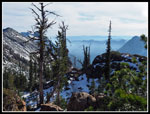 Smoke In The Valley |
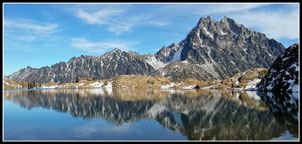 Panorama Of Ingalls Lake With Mt. Stuart |
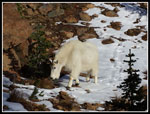 Last Goat Of The Day |
Trips - 2017
Home
